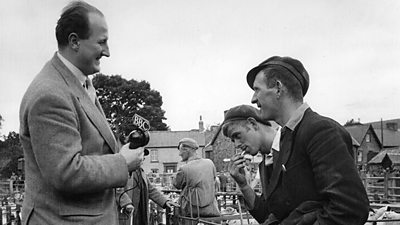Image: ����ý World Service documentary feature 'The Nurses' (1965) looking at the role of nurses in the National Health Service. Ann Austin talked to Sister Foster who was in charge of the intensive care unit at St. George's Hospital, Tooting.
During the Second World War, the ����ý’s overseas services provided a valuable window onto the rest of the world: a cultural bridge between the United Kingdom and a global audience of many millions. Moreover, the ability of broadcasting to reach inside people’s homes and lives was an incredibly powerful tool.
Just as importantly, ����ý programmes also offered overseas audiences a glimpse of life in Britain, its values and institutions. The significance of this as a promotional device was not lost on either the Corporation or the British government, which funded overseas broadcasting. So, how did the ����ý go about the ‘projection of Britain’ in its international output?

The ����ý Empire Service had, of course, been projecting a particular strain of imperial identity since 1932, but war had restructured the international and strategic context in which the ����ý broadcast. It also recalibrated what Britain stood for, as a set of ideas and values and as a world power. Victorious, economically impoverished and damaged, Britain viewed the postwar world with a mixture of confidence and anxiety as old imperial certainties crumbled and global power blocs reshaped the geopolitics of a new age.
Writing in the summer of 1946 the British government’s Ministerial Committee on Overseas Information identified four key themes for the "Projection of Britain Overseas": Britain as a political and social democracy; Britain as a world power; Britain and world trade; British Commonwealth and Empire.
These set the template on which the ����ý was expected to promote British interests in its English and foreign language broadcasts. For Ian Jacob, who by 1948 was the ����ý’s Director of External Services, the first aim of overseas broadcasting was "the projection of Britain, British activities and aims, and the British way of life and thinking".
In this way, the projection of Britain by the ����ý became a form of cultural diplomacy, using the relationship between the broadcaster and its audiences to highlight British interests, concerns and achievements. However, the means by which the ����ý was able to do this varied from service to service. In its European Services, for example, the actions of the Soviet Union during the early Cold War shaped the way in which the projection of Britain could be applied, as Ian Jacob was forced to admit:
"When, as now, the British people are engaged in a struggle to maintain their existence and way of life in the face of a campaign of propaganda and subversive activity, openly designed to overthrow them, we must not in any way shrink from giving full expression to the British view, and to assist by all means in our power the national effort. Only in this way shall we be framing our programmes in the national interest."
For Gerard Mansell who would later succeed Jacob at Bush House, when broadcasting to Central and Eastern Europe one had to assume the audience had limited or no knowledge of Britain. Nevertheless, he considered the projection of Britain as an extremely useful tool for exposing the lack of freedoms and rights experienced under communist rule.
Similar tactics would not have suited the English-language General Overseas Service, which had evolved out of Empire broadcasting and in 1965 was renamed the World Service. Its audiences had a different and closer relationship with Britain, if only through a shared linguistic understanding. For Austen Kark, who was in charge of overseas broadcasting in the 1980s, this was a defining attribute that allowed the ����ý to engage culturally diverse audiences throughout the world.
"English is a world language... there are enough people who speak English as a preferred second language throughout the world. For example, in the subcontinent English is one of the official languages and it is indeed the main language of communication between different parts of India and different parts of Pakistan. One could go on, saying the same thing is true of Africa. It is of course true of North America and it’s true of Australia and New Zealand, but it’s also true of an awful lot of other countries – English is a language of communication."
Kark also identified the ability of the ����ý to talk to audiences as an editorially independent broadcaster, capable of reflecting criticism of British government policy, as was the case during the 1956 Suez crisis. This gave its programmes a credibility that they otherwise might not have had. Ironically, it was this freedom of action and the trust it engendered with audiences that made ����ý overseas broadcasting such a powerful tool of British public and cultural diplomacy.
As Kark points out, the ability of the ����ý to talk to audiences as an editorially independent broadcaster, capable of reflecting criticism of British government policy, as was the case during the 1956 Suez crisis, gave its programmes a credibility that they otherwise might not have had.
Meanwhile, British national identity, its characteristics and capabilities, changed considerably after the Second World War. Decolonisation, trade and globalisation, among other factors, all reshaped Britain’s demographic, economic and cultural profile.
New communities, such as those led by the 492 West Indians who arrived on HMT Empire Windrush in June 1948, established themselves as part of a diverse and cosmopolitan British nation that increasingly reflected the world in microcosm. As such, the ����ý’s projection of Britain was concerned with the changing nature of Britishness just as much as with the strategies used to engage audiences overseas.
While the ����ý’s expatriate audience continued to feature in assessments of international output, over time they became a secondary target as the editorial focus shifted to better reflect the ����ý’s wider overseas audience. Partly, this was an inevitable result of decolonisation. However, it was also a consequence of the emergence of indigenous broadcasting infrastructures at a local level, against which the ����ý’s shortwave transmissions (with their problems of reception and audibility) found it hard to compete. As the former ����ý Director-General Charles Curran put it:
"More and more the local broadcasting service in a particular territory was becoming the primary instrument of communication. And therefore, if one wanted to have an audience for ����ý programmes overseas and for British programmes overseas, it had to be by means of the recording made available to the overseas broadcaster."
As a consequence, the ����ý became increasingly reliant on retransmission by local broadcasters, who had their own distinct conception of who their target audiences were.
Interestingly, the changing nature of the UK’s imperial relations and the retreat from empire were themselves deployed by the ����ý in its projection of Britain output. In the context of the cold war of words, the ����ý felt it necessary to respond to the Soviet Union's criticism of British imperialism. Accordingly, the European Services’ Walter Kolarz and Martin Esslin were dispatched to Africa in 1950 to report on the positive developments in colonial administration. As Esslin recalls, it was a productive editorial line to take.
The juxtaposition of the positive achievements of the British Commonwealth, in comparison to the colonialism of the Soviet Union in Central and Eastern Europe, was one way in which the ����ý used "projection of Britain" material in broadcast output. More broadly - across English and foreign language services for Europe, Africa, Asia, North and South America, and the Commonwealth - it was a useful mechanism through which changes in British society and the UK’s overseas responsibilities and actions could be narrated sympathetically.
It also enabled the ����ý, who at the time was charged with broadcasting in the "national interest", to pursue its journalistic principles of reporting objectively and accurately, while simultaneously providing the British government who funded its overseas services with a political and diplomatic dividend. In this sense, the projection of Britain was a great example of the ����ý practising what today would be described as "soft power".

